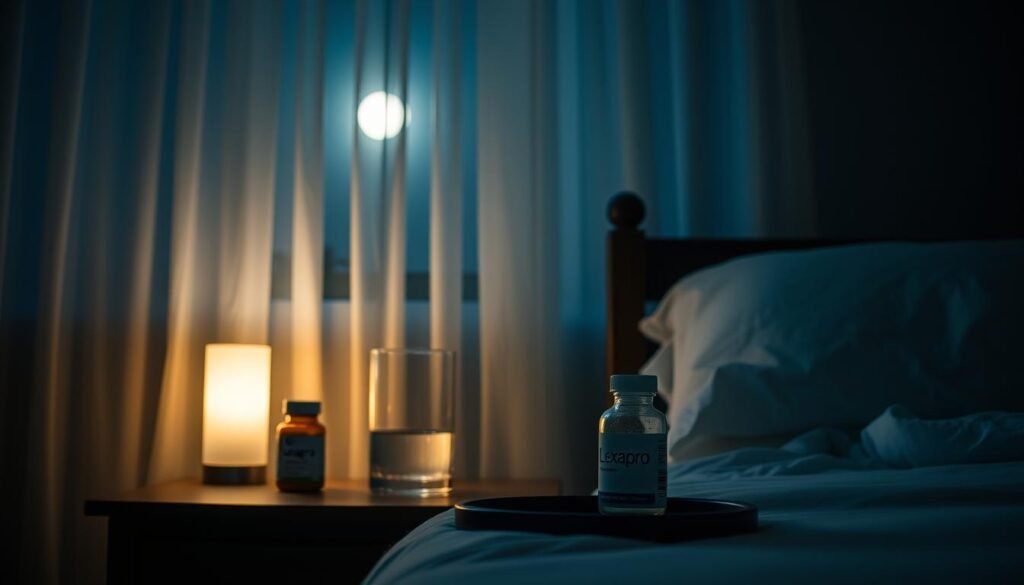Did you know that Lexapro, a common antidepressant, causes up to 20% of its users to have insomnia? This fact points out a problem for many who want to feel better emotionally but end up not sleeping well. Lexapro’s effect on sleep is complicated. Although it helps with anxiety and depression, it can mess up your sleep cycle. This can lead to a cycle of bad sleep and worse mood symptoms. It’s important to know how to deal with insomnia caused by Lexapro for your overall health and happiness.
Key Takeaways
- Up to 20% of individuals on Lexapro may experience insomnia as a side effect.
- Lexapro can affect serotonin levels, disrupting the sleep-wake cycle.
- Insomnia linked to Lexapro is often temporary and improves over time.
- Consulting with healthcare providers is essential for managing sleep issues.
- Adopting lifestyle changes can help improve sleep quality while on Lexapro.
What is Lexapro and How Does It Work?
Lexapro is also known as escitalopram. It is part of the selective serotonin reuptake inhibitors antidepressants. This medicine focuses on serotonin, a key brain chemical affecting mood. By boosting serotonin, Lexapro helps ease depression and anxiety symptoms.
The U.S. Food and Drug Administration (FDA) backs Lexapro for adults and kids over 12 with depression. It’s also used for adult anxiety. Doctors might prescribe it for other issues like panic or stress disorders, even though that’s not its main use.
Starting with 10 milligrams a day is common, but it could go up to 20. Most people see improvements after 4 to 6 weeks. That’s why many prefer Lexapro over other antidepressants.
However, Lexapro might cause some side effects like trouble sleeping. Close to 75% of depressed people have sleep issues. Side effects such as dizziness, stomach problems, and weight changes can also happen. Following directions and watching for side effects at the start is crucial.
Understanding Lexapro Insomnia
Lexapro is a common antidepressant that impacts mental health and sleep. Over 10% of users struggle with insomnia, making it a significant escitalopram side effect. People often find it hard to fall asleep, stay asleep, or wake up too early because of it.
Insomnia can also link to other mental issues like major depressive disorder (MDD) and generalized anxiety disorder (GAD). These conditions can make sleep problems worse. It’s important to know if Lexapro directly causes insomnia or if it’s due to these mental health issues.
It’s crucial to understand how SSRIs affect sleep. Most depressed patients have sleep problems, and these can change over time. Insomnia from Lexapro usually gets better within the first two weeks. If it doesn’t, or gets worse, you might need a different treatment.
Dealing with this insomnia means looking for treatment options. Tips include changing when you take Lexapro, avoiding alcohol and caffeine late in the day, and practicing good sleep habits. These steps can help you manage sleep issues while benefiting from Lexapro.
Can Lexapro Cause Insomnia?
Many people taking Lexapro encounter escitalopram’s side effects, including insomnia. Studies show about 9% of Lexapro users report insomnia. This is more than the 4% who report the same while on a placebo. It’s clear that Lexapro can make it harder for people to sleep.
Lexapro affects serotonin levels and sleep. Serotonin is key in controlling our sleep. Some patients see their sleep improve in one to two weeks. Yet, for others, sleep troubles can last up to four weeks. The FDA points out that adults with major depressive disorder have a 5% higher risk of insomnia with Lexapro than with a placebo.
Fatigue and insomnia are common side effects. Many people start to sleep better shortly after they start Lexapro. However, some may have ongoing sleep problems. To handle managing insomnia with Lexapro better, try making your room more sleep-friendly and cutting back on caffeine.
| Duration of Sleep Disruption | Percentage of Users Reporting Insomnia |
|---|---|
| Less than 1 week | 20% |
| 1 to 2 weeks | 50% |
| 2 to 4 weeks | 30% |
| More than 4 weeks | 10% |
If Lexapro is making it hard for you to sleep, talk to your doctor. It’s important, especially if the problem lasts more than a month. Changing the dose might help you sleep better.
Recognizing Symptoms of Lexapro-Induced Insomnia
Many people on Lexapro face insomnia symptoms that mess up their sleeping habits. They find it hard to fall asleep, even when tired. They might wake up a lot at night. And often, they wake up too early and can’t sleep again. These sleep problems don’t just stop you from resting well. They also make you tired, easily annoyed, and less focused during the day.
It’s vital to notice if sleep issues begin while using Lexapro. Knowing these signs helps you talk better with doctors. Together, you can make a plan to manage these problems but still get the good effects of the sleep problems medication.

The impact of Lexapro on sleep varies by individual. Being aware is key to handling it well. This might mean changing your daily routine or getting medical help. For more help, check out the article here for in-depth tips on managing these side effects.
| Insomnia Symptoms | Impact on Daily Life |
|---|---|
| Trouble falling asleep | Increased fatigue |
| Frequent night awakenings | Irritability |
| Early morning wakefulness | Reduced focus |
| Inability to return to sleep | Decreased productivity |
Managing Insomnia with Lexapro
Dealing with insomnia while on Lexapro requires certain strategies for better sleep. It’s important to know when to take your medication. Avoiding some substances and making your sleep area cozy are key steps.
Adjusting the Timing of Lexapro Intake
Taking Lexapro in the morning is wise. It can help avoid insomnia that might come from taking it later. This regular habit supports better sleep.
Avoiding Alcohol and Caffeine
It’s crucial to limit or skip caffeine and alcohol. These can mess with your sleep and worsen insomnia. By cutting these out, a good night’s rest becomes more possible.
Creating a Sleep-Friendly Environment
Making your bedroom ready for sleep is essential. It should be quiet, dark, and cool for the best rest. Little changes, like using blackout curtains and white noise machines, can make a big difference.
| Approach | Description | Benefits |
|---|---|---|
| Timing of Medication | Take Lexapro in the morning | Reduces insomnia side effects |
| Avoiding Substances | Limit caffeine and alcohol intake | Stabilizes sleep patterns |
| Sleep-Friendly Environment | Create a conducive sleeping space | Enhances relaxation and promotes better sleep |
Exploring Alternative Insomnia Treatment Options
If you can’t sleep, think about other ways to treat insomnia aside from changing drugs like Lexapro. Many strategies work well for sleep problems. Treatments like cognitive-behavioral therapy for insomnia (CBT-I) are now quite popular. They help people sleep better without having to always use medicine.
Behavioral Therapies
Behavioral therapies aim to change the thoughts and actions that make insomnia worse. CBT-I, for example, has helped many people control their insomnia. It uses methods like limiting time in bed, controlling what you associate with sleep, and learning about good sleep habits. Doing regular things for better sleep can make the positive effects of CBT-I last longer.
Over-the-Counter Remedies
OTC sleep aids are another option for short-term sleep problems relief. It’s essential to talk with doctors about these, especially if you’re taking medicines like Lexapro. Common OTC solutions are diphenhydramine and melatonin, which help you fall asleep. However, it’s important to use these aids wisely to avoid bad side effects or drug interactions.
Mixing behavioral therapies with OTC sleep aids can be a good plan for dealing with insomnia. Knowing all the ways to treat insomnia beyond just medicine helps people find the best option for them. To learn about different treatment methods and how they work, check out this research study.

Impact of Lexapro on Sleep Quality
Lexapro has a big effect on sleep because it’s a selective serotonin reuptake inhibitor (SSRI). This class of drugs and sleep have a complicated link. This is because they raise serotonin levels in your brain, which can change how you sleep. People taking Lexapro often notice their sleeping habits change. They might find it hard to fall asleep or have more intense dreams or nightmares. It’s important for people on Lexapro to understand these effects.
Effects of SSRI on Sleep Patterns
Lexapro changes normal sleep by boosting brain serotonin. This increase helps manage mood and feelings, key for good sleep. But, low serotonin can lead to sleep problems like insomnia. Therefore, Lexapro users might find their sleep disrupted in different ways:
- Having trouble falling asleep
- Waking up often during the night
- Experiencing vivid dreams or nightmares
- Seeing a decrease in REM sleep
How these issues show up can vary by person and the amount of medication taken. This risk of antidepressant sleep disturbances means doctors should watch their patients closely.
Comparative Analysis with Other Antidepressants
Compared to other antidepressants, Lexapro’s impact on sleep is special. Research shows that different SSRIs can affect sleep in various ways.
| Antidepressant | Impact on Sleep Quality | Common Sleep Disturbances |
|---|---|---|
| Lexapro | Variable; can improve or disrupt | Difficulty falling/staying asleep, vivid dreams |
| Fluoxetine (Prozac) | May cause insomnia | Increased awakenings |
| Amitriptyline | Generally improves sleep | Decreased REM sleep |
Research suggests some SSRIs, like Lexapro, might initially worsen sleep. But, they could improve it over time for some. This is why it’s crucial for patients to talk with their doctors about sleep issues during treatment.
Lexapro Dosage for Insomnia Management
Understanding the right lexapro dosage for insomnia is key. For adults, starting with 10 mg per day is common. This amount may change depending on how one reacts to the medicine. If sleep problems do not improve, adjusting the dose is important to find what works best.
Standard Dosages and Adjustments
Lexapro comes in 5 mg to 20 mg tablets. Most people start with 10 mg a day. Based on how the body responds, this can go up to 20 mg. However, for those with liver issues, it’s best to not exceed 10 mg a day. Liquid forms of Lexapro are also an option, measured in drops:
| Form | Dosage |
|---|---|
| Tablets | 5 mg, 10 mg, 20 mg |
| Liquid Drops | 1 drop = 1 mg; 10 drops = 10 mg; 20 drops = 20 mg |
Lexapro is usually taken once every day, with or without food. It’s important to see your doctor regularly. They can check how well the medication is working and adjust the dosage if needed.
Consulting with Healthcare Providers
Talking with your doctor is crucial when managing lexapro for insomnia. They help adjust the dose and monitor any side effects. Doctors often suggest staying on the medication for a few months after feeling better to avoid relapse. Stopping Lexapro should be done slowly to avoid withdrawal, under a doctor’s advice. For extra details on dosage and potential interactions, click here.

When to Seek Medical Attention for Lexapro-Induced Insomnia
If you’re having trouble sleeping because of Lexapro, know that you’re not alone. About 20% of people taking Lexapro experience insomnia. It’s important to recognize when it’s time to get help. This can ensure you get the treatment you need to sleep better.
Identifying Severe Symptoms
Severe symptoms of insomnia can really impact your life. They include feeling extremely tired, mood swings, and a drop in how you perform daily activities. If these symptoms don’t go away after a few weeks or make life hard to manage, it’s time to see a doctor. This is especially true if you feel very irritable or anxious because of your lack of sleep.
Communicating with Your Doctor
Talking openly with your doctor is key. Share how insomnia affects you to have meaningful conversations during office visits. Don’t hold back if you’re facing severe sleep issues or feeling down. Your doctor needs to know.
By being honest, you might get to try different treatments. This could help you sleep better and improve your overall health.
| Severe Insomnia Symptoms | Recommended Action |
|---|---|
| Debilitating fatigue | Seek medical attention immediately |
| Significant mood changes | Communicate with your healthcare provider |
| Persistent sleep disruptions lasting longer than four weeks | Consult a doctor for evaluation |
| Increased anxiety or irritability | Discuss symptoms with a healthcare provider |
Conclusion
It’s vital to manage Lexapro insomnia to boost mental health and wellness. Up to 20% of Lexapro users might face sleep disturbances. Seeking advice from healthcare providers and adjusting the medication can help tackle this problem and enhance sleep quality.
Serotonin levels and sleep have a deep bond. Lexapro impacts these levels, leading to sleep troubles for some. Yet, it’s crucial to note that Lexapro’s insomnia is often short-lived. The body usually adapts to the medication over time.
Making lifestyle changes and trying behavior therapies can help ease Lexapro-related sleep issues. Holistic methods and open dialogue with healthcare professionals are key. They help individuals deal with insomnia effectively on their mental health journey.